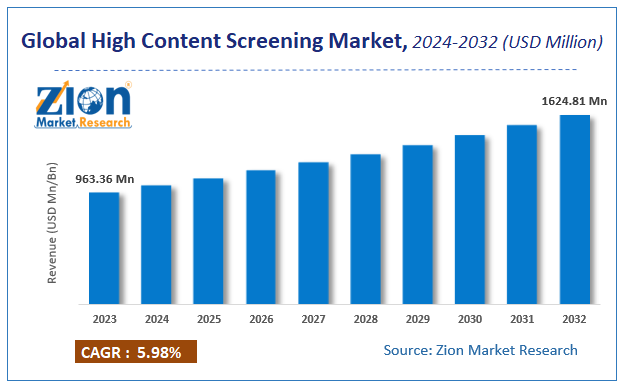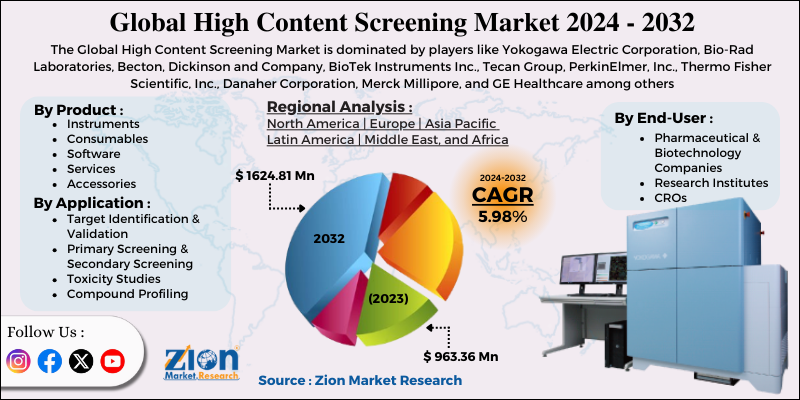High Content Screening Market Size, Share, And Growth Report 2032

High Content Screening Market By Product (Services, Software, Accessories, Consumables and Instruments), By Application (Compound Profiling, Toxicity Studies, Target Identification and Validation, Primary and Secondary Screening and Other Applications), By End User (Research Institutes, Contract Research Organizations (CROs) and Pharmaceutical and Biotechnology Companies), By Region - Global And Regional Industry Overview, market Intelligence, Comprehensive Analysis, Historical Data, And Forecasts 2024-2032
| Market Size in 2023 | Market Forecast in 2032 | CAGR (in %) | Base Year |
|---|---|---|---|
| USD 963.36 Million | USD 1624.81 Million | 5.98% | 2023 |
High Content Screening Market Size
The global High Content Screening market size was worth around USD 963.36 million in 2023 and is predicted to grow to around USD 1624.81 million by 2032 with a compound annual growth rate (CAGR) of roughly 5.98% between 2024 and 2032.
The study provides historical data from 2018 to 2022 along with a forecast from 2024 to 2032 based on revenue (USD million). The report covers a forecast and an analysis of the High Content Screening market on a global and regional level.
High Content Screening Market: Overview
High content screening (HCS) is a screening technology to detect cell phenotype alteration by substances like peptides, small molecules, or RNAi and is used in drug discovery and biological research. It is also called cellomics or high content analysis (HCA). High content analysis involves phenotypic cell analysis in components of the cell or whole cells' real-time readout of numerous parameters. Phenotypic alterations may include a decrease or increase in the production of cellular products and visual appearance changes of cells. Automated microscopy along with image analysis is used in HCS. Unlike high throughput screening, high content screening may be low in throughput but high in content.
The demand for the high content screening market is driven by technological advancements in cell imaging solutions and instruments in terms of quality and efficiency. Also increasing need to reduce costs in pharmaceutical R&D, advancements in imaging instruments and informatics solutions, government grants and venture capital investments are factors that boost the market growth. However, the higher cost of instruments has led to a lower adoption rate which may act as a restraining factor for the market growth. The growing focus of CROs to offer high content screening services and potential applications of high content screening in personalized medicine are expected to bring new growth opportunities for major market players of high content screening.
The study includes drivers and restraints for the high content screening market along with the impact they have on the demand over the forecast period. Additionally, the report includes the study of opportunities available in the high content screening market on a global as well as regional level.
In order to give the users of this report a comprehensive view of the high content screening market, we have included a competitive landscape and analysis of Porter’s Five Forces model for the market. The study encompasses a market attractiveness analysis, wherein all segments are benchmarked based on their market size, growth rate, and general attractiveness.
The report provides a company market share analysis in order to give a broader overview of the key players in the high content screening market. In addition, the report also covers key strategic developments of the market including acquisitions & mergers, new product launches, agreements, partnerships, collaborations & joint ventures, research & development, and regional expansion of major participants involved in the high content screening market on a global and regional basis.
High Content Screening Market: Segmentation
The study provides a crucial view on the high content screening by segmenting the market based on product, technology, application, end user, and region. All the segments of the high content screening market have been analyzed based on present and future trends and the market is estimated from 2024 to 2032.
Based on product, the global high content screening market is bifurcated into services, software, accessories, consumables, and instruments. The instruments segment is sub-segmented into flow cytometers and cell imaging and analysis systems. The instruments segment accounted for the largest market share in 2023 whereas the software segment is expected to grow at the highest CAGR over the forecast period. Technological advancements in instrumentation, high price, and instrument automation are major factors that attribute to the large share of the instrument product segment.
Based on applications market is segmented into compound profiling, toxicity studies, target identification and validation, primary and secondary screening, and other applications. The target identification and validation application segment held the largest market share in 2023. The drug discovery process involves target identification and validation as initial steps. Financial losses due to drug attrition in later stages of clinical trials can be minimized using HCS for target identification and validation. Target identification is an important step in drug discovery. The primary and secondary screening application segment will witness the highest growth rate over the forecast period.
The end user segment is divided into research institutes, contract research organizations (CROs), and pharmaceutical and biotechnology companies. The largest end users for the high content screening market in 2018 were pharmaceutical & biotechnological companies. Increasing drug development activities by major pharmaceutical and biopharmaceutical companies have resulted in greater adoption of high content screening technologies by these end users and thus account for the largest market share. The increasing focus of CROs to offer to outsource of drug discovery services has led to faster adoption of HCS technologies by CROs and thus CROs will register the highest growth in the years to come.
High Content Screening Market: Report Scope
| Report Attributes | Report Details |
|---|---|
| Report Name | High Content Screening Market |
| Market Size in 2023 | USD 963.36 Million |
| Market Forecast in 2032 | USD 1624.81 Million |
| Growth Rate | CAGR of 5.98% |
| Number of Pages | 110 |
| Key Companies Covered | Yokogawa Electric Corporation, Bio-Rad Laboratories, Becton, Dickinson and Company, BioTek Instruments Inc., Tecan Group, PerkinElmer, Inc., Thermo Fisher Scientific, Inc., Danaher Corporation, Merck Millipore, and GE Healthcare among others |
| Segments Covered | By product, By technology, By application, By end user and By Region |
| Regions Covered | North America, Europe, Asia Pacific (APAC), Latin America, Middle East, and Africa (MEA) |
| Base Year | 2023 |
| Historical Year | 2018 to 2022 |
| Forecast Year | 2024 - 2032 |
| Customization Scope | Avail customized purchase options to meet your exact research needs. Request For Customization |
High Content Screening Market: Regional Analysis
North America dominated the global high content screening market in 2023. The increasing focus of pharmaceutical and biopharmaceutical companies on novel drug development, growing investments in R&D, availability of funds, growing demand for personalized medicine, presence of developed R&D infrastructure, and technological advancements are factors driving the market in this region. Europe was the second largest regional market. The rise in R&D spending for drug discovery and development services, the presence of developed infrastructure, and government initiatives are some of the factors that boost the market growth in this region. Latin America is expected to witness moderate growth over the forecast period. Asia Pacific region will exhibit the highest growth in the high content screening market in the coming years. The focus of contract research organizations on business expansion and capturing growth opportunities in emerging nations, the surge in pharmaceutical and biopharmaceutical research in countries like India and China, and government initiatives to improve infrastructure and enhance drug discovery research are factors promoting high content screening market growth in the Asia Pacific. Lack of infrastructure and funds may attribute to slower growth in the Middle East and Africa.
High Content Screening Market: Competitive Players
Major players included in the report are:
- Yokogawa Electric Corporation
- Bio-Rad Laboratories
- Becton
- Dickinson and Company
- BioTek Instruments Inc.
- Tecan Group
- PerkinElmer Inc.
- Thermo Fisher Scientific Inc.
- Danaher Corporation
- Merck Millipore
- GE Healthcare
The Global High Content Screening Market is segmented as follows:
Global High Content Screening Market: By Product
-
Instruments
- Cell Imaging and Analysis Systems
- Flow Cytometers
- Consumables
- Software
- Services
- Accessories
Global High Content Screening Market: By Application
- Target Identification and Validation
- Primary Screening and Secondary Screening
- Toxicity Studies
- Compound Profiling
- Other Applications
Global High Content Screening Market: By End User
- Pharmaceutical & Biotechnology Companies
- Research Institutes
- Contract Research Organizations (CROs)
Global High Content Screening Market: By Region
- North America
- The U.S.
- Europe
- UK
- France
- Germany
- Asia Pacific
- China
- Japan
- India
- Latin America
- Brazil
- The Middle East and Africa
Table Of Content
Methodology
FrequentlyAsked Questions
High Content Screening (HCS) is a powerful technique used in cell biology and drug discovery to analyze and quantify multiple cellular parameters simultaneously within large populations of cells.
According to study, the High Content Screening Market size was worth around USD 963.36 million in 2023 and is predicted to grow to around USD 1624.81 million by 2032.
The CAGR value of High Content Screening Market is expected to be around 5.98% during 2024-2032.
North America has been leading the High Content Screening Market and is anticipated to continue on the dominant position in the years to come.
The High Content Screening Market is led by players like Yokogawa Electric Corporation, Bio-Rad Laboratories, Becton, Dickinson and Company, BioTek Instruments Inc., Tecan Group, PerkinElmer Inc., Thermo Fisher Scientific Inc., Danaher Corporation, Merck Millipore, and GE Healthcare among others.
Choose License Type
RelatedNews
HappyClients
Zion Market Research
Tel: +1 (302) 444-0166
USA/Canada Toll Free No.+1 (855) 465-4651
3rd Floor,
Mrunal Paradise, Opp Maharaja Hotel,
Pimple Gurav, Pune 411061,
Maharashtra, India
Phone No +91 7768 006 007, +91 7768 006 008
US OFFICE NO +1 (302) 444-0166
US/CAN TOLL FREE +1 (855) 465-4651
Email: sales@zionmarketresearch.com
We have secured system to process your transaction.
Our support available to help you 24 hours a day, five days a week.
Monday - Friday: 9AM - 6PM
Saturday - Sunday: Closed







